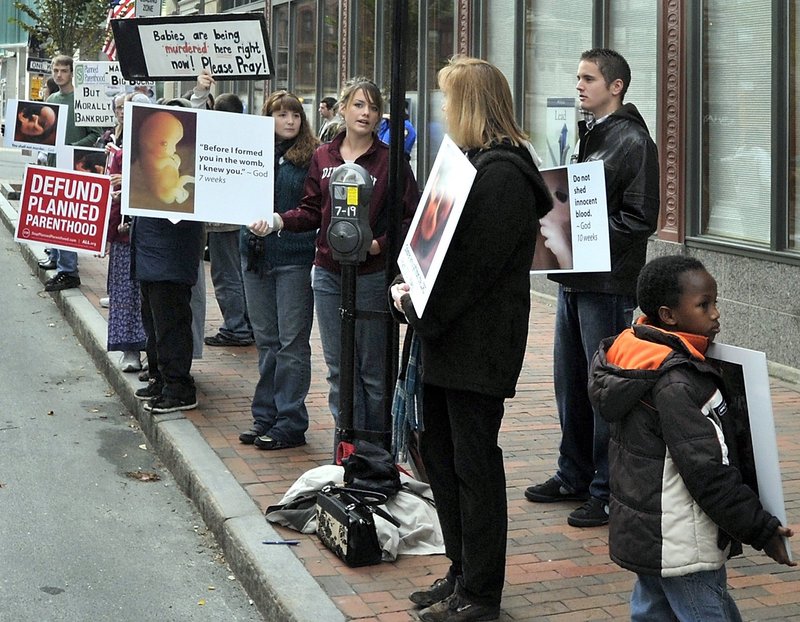Every Friday morning since summer, 10 to 20 protesters have been demonstrating outside the Planned Parenthood clinic at 443 Congress St. They recite prayers, carry signs covered with photographs of aborted fetuses and sometimes shout at women entering the clinic.
In response to the concerns of the building’s owners and tenants, including Planned Parenthood, city officials are now looking at legal options for limiting the protests, including setting up a “buffer zone” between the protesters and the clinic doors.
Portland Mayor Michael Brennan said it’s important that the city’s actions are constitutionally defensible because he doesn’t want an expensive legal battle.
“We want to respect the fact that people have the right to protest, but at the same time, women who are seeking services have the right to those services, and people who work in the building have the right to get into the building without being intimidated,” Brennan said.
He said it’s unclear whether the City Council or the Legislature would establish a buffer zone. A handful of states have passed laws to create such zones in response to abortion protests at medical facilities.
In February, a federal judge upheld a 2007 Massachusetts law that established a 35-foot buffer zone at clinics statewide. In August, the city council in Burlington, Vt., established a so-called “safety zone” 35 feet from the entrance to a Planned Parenthood clinic.
Planned Parenthood, which has four clinics in Maine, is the largest U.S. provider of reproductive health services. That includes breast cancer screenings, HIV screenings, contraception, counseling and abortion services.
In Maine, only the Portland clinic provides abortion services and only on Fridays.
The organization earlier this fall hired an off-duty police officer to patrol the sidewalk during the protests. Police have been monitoring the demonstrations to make sure they don’t become violent, said Cmdr. Gary Rogers of the Portland Police Department.
Establishing a buffer zone would protect both the First Amendment rights of protesters and the rights of women to access heath care in privacy, said Megan Hannan, director of public affairs for Planned Parenthood of Northern New England.
If a buffer zone is established, however, the protesters will bring larger signs, said Leslie Sneddon of Richmond, regional director for the Center for Bio-Ethical Reform, a national anti-abortion group that is one of the organizers of the Congress Street protests.
Her group has access to a 33-foot-long truck that can serve as a billboard for images of aborted fetuses. After Jan. 1, protesters plan to demonstrate at the clinic more frequently, she said.
“We will be increasing the street witness hopefully to five days a week because they kill five days a week,” she said.
The protesters recite prayers and tell women they have alternatives to abortion. They sometimes scream at them, said Mike Fink, who owns Guitar Grave and Mike’s Restaurant, both located in the same building as Planned Parenthood.
He said the protests disrupt businesses on the block, and that he now dreads coming to work on Fridays. Fink said he turns up music to drown out the protesters, and he is trying to organize counter-demonstrations.
“I used to be able to shrug it off, but it’s getting worse and worse,” he said.
Fink attended a meeting at City Hall last week about the issue. Others at the meeting included Brennan, City Manager Mark Rees, acting city attorney Danielle West-Chuhta and state Senate President Justin Alfond, D-Portland, who is one of the building’s owners.
The American Civil Liberties Union of Maine has been monitoring the protests and wants to be included in discussions about setting limits, said Shenna Bellows, the group’s executive director.
She said city officials need to “tread carefully” to make sure that the rights of both the protesters and the clinic’s clients are protected.
Jessica Butts, 35, a Portland resident and a client at the clinic, said the city should create a “safety zone” to protect clients from being intimidated. Butts said her friends who work there are also afraid.
“I know they are wondering why they seem to have been abandoned by the city,” she said.
Staff Writer Tom Bell can be contacted at 791-6369 or at:
tbell@pressherald.com
Send questions/comments to the editors.





Success. Please wait for the page to reload. If the page does not reload within 5 seconds, please refresh the page.
Enter your email and password to access comments.
Hi, to comment on stories you must . This profile is in addition to your subscription and website login.
Already have a commenting profile? .
Invalid username/password.
Please check your email to confirm and complete your registration.
Only subscribers are eligible to post comments. Please subscribe or login first for digital access. Here’s why.
Use the form below to reset your password. When you've submitted your account email, we will send an email with a reset code.